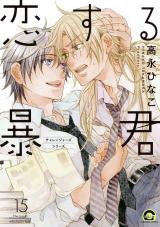I'd like to add my own perspective in the mix of opinions I've seen so far.
Let me start with the fact that I've known this series for quite a long time and I've loved it from the start. It has a good blend of drama and humour that I like, without getting stale like many other stories out there. It's a slow-burner for sure, but every small step forward feels rewarding. For all their toxicity, both characters have a charm that has stuck with me from the start.
Now I do understand where people are coming from when they say they don't like the rape-themes and abusive portrayals in this manga. If you view it from a real-world perspective then it's definitely toxic. It also just isn't very good gay/queer representation.
But the caveat for me is this; I think it's not written to be either realistic or queer representation and it should not be read with this expectation in mind.
On one hand the story does portray the rape and constant crossing of boundaries as something negative, but on the other it quickly dismisses it for the romance/plot. For some people this won't feel right, and that's valid.
The reason the rape/abusive scenes never truly registered in my mind as problematic (even though thinking about it realistically I understand that it is) is because it has always felt like a big exaggeration. Souichi's violent behaviour is cranked up to the point he yells at- and beats people almost without any repercussions. Morinaga's constant pushing of boundaries ventures into the unreasonable. It's played out like a caricature. Souichi's stundere characterisation is at its max.
I have personally always struggled with intimacy, but not for a lack of desire. In a strange way it felt satisfying to imagine someone knowing me better than I'd know myself, who is able to push through the massive barrier I had put up in my mind. This is what this manga felt like for me; Souichi is verbally and physically denying that he wants Morinaga, but through other (small) gestures Morinaga has seen through the facade and figures Souichi needs the charade to justify staying with Morinaga to himself.
In reality this would be abusive and toxic. No other person could know you better than you know yourself, and no one should use your mental struggles to their advantage. But this is a fantasy. And in that fantasy there is the constant small reminders of how Souichi truly feels. And as the series progresses, they both learn and adapt. Morinaga learns to respect his senpai more, and Souichi comes out of his shell more and learns to accept himself and Morinaga for who they truly are. It's almost a little cathartic to me.
But not everyone will have the same fantasy, and that's okay.
Finally, I gave it 8/10 because I personally thought the art style had gotten a little more sloppy with quality and proportions in the later volumes, possibly due to time pressure. So I liked it a bit more in the earlier volumes.





